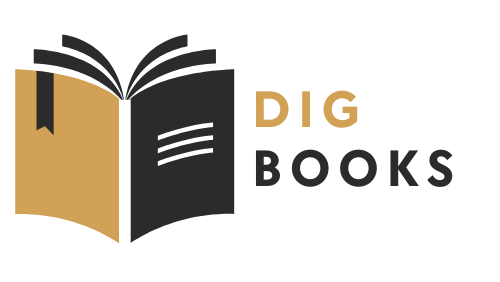The 21 Best Books On Self Development In 2024
The 21 Best Books On Self Development In 2024
Embarking on a journey of self-improvement can often feel like navigating through an uncharted forest, lush with a dense undergrowth of options yet mysteriously inviting. In this milieu, the best books on self development serve as your compass, guiding you through the thicket with insights and strategies that light up the path to personal growth. With each page turned, a new layer of understanding is added, building a richer, more nuanced map of your inner landscape, and what it takes to cultivate it.
Key Points:
- Self-development books serve as compasses guiding personal growth.
- Selection process involves understanding themes and reader needs.
- Books chosen for impact and practical strategies for a fulfilling life.
- Atomic Habits by James Clear offers actionable habits framework.
- Thinking, Fast and Slow by Daniel Kahneman delves into decision-making processes.
- The Subtle Art of Not Giving a F*ck by Mark Manson provides honest self-help advice.
- How to Win Friends and Influence People by Dale Carnegie offers timeless leadership principles.
As a passionate curator of literary treasures, I have spent countless hours in cozy bookshops and vast online repositories, sifting through reader feedback and critical reviews to compile a list that resonates with the diversity and depth of human experience. This quest has revealed to me not just fables of personal triumph and textbooks of psychological theories but narratives that transcend the ordinary, inviting readers to explore the recesses of human potential and the artistry of living well.
Naturally, the selection process is both a challenge and a delight. It demands an acute understanding of themes, a sensitive grasp on reader’s needs, and an appreciation for the transformative power of well-crafted words. The joy of uncovering a gem that could potentially alter the course of someone’s life is immeasurable. It’s with this joy that I share these findings with you, hoping to illuminate aspects of self-development that are as enlightening as they are liberating.
The 21 Best Self Development Books
As we stride into 2023, the landscape of self-development literature continues to evolve rapidly, with innovative concepts and transformative insights emerging from the bright minds of today’s thought leaders. This year’s compilation of the 23 best books on self-development is a testament to the ever-expanding universe of personal growth and enlightenment. It includes timeless classics that have continued to inspire generations, alongside modern masterpieces that tackle contemporary challenges, offering readers a balanced diet of proven wisdom and fresh, cutting-edge perspectives. Each book on this list has been chosen for its profound impact, potential to provoke thought, and ability to provide practical strategies that readers can apply in their pursuit of a more fulfilling life.
1. Atomic Habits by James Clear

James Clear’s “Atomic Habits” offers a robust blueprint for those looking to reshape their lives through the power of tiny changes. Drawing from his own experience, Clear outlines how he overcame a serious accident by tweaking his daily habits, ultimately leading to significant life improvements. This personal touch not only adds authenticity but also makes the journey towards habit transformation relatable and achievable.
The book dives deep into the intricacies of how habits form, utilizing the compelling metaphor of the bamboo tree to explain the compounding effect of small actions. Clear’s expertise shines through in his elaboration on the four laws of behavior change, providing a clear and actionable framework for readers to follow. Through engaging examples and accessible strategies like the ‘Two-Minute Rule’, Clear demystifies the process of building beneficial routines and dismantling harmful ones.
The strength of “Atomic Habits” lies in its holistic approach, considering factors such as identity and environment in habit formation. Clear emphasizes the importance of aligning habits with one’s identity and leveraging one’s surroundings to foster better habits. These insights offer a fresh perspective on habit change, challenging conventional focus on outcomes alone.
Pro:
- Provides a clear, actionable framework for understanding and changing habits.
- Incorporates personal anecdotes that make the content relatable and engaging.
- Offers deep insights into the psychology behind habits, including environment and identity considerations.
Contra:
- Some readers may find the initial concepts to be repetitive if they are already familiar with habit formation theories.
- The detailed approach might overwhelm those looking for a quick or simplistic solution to habit change.
- Requires commitment to apply the strategies consistently over time for visible results.
I recommend this book to you if:
- You are looking for a detailed, research-backed guide on building positive habits and breaking negative ones.
- You appreciate the blend of personal stories and scientific research in non-fiction.
- You are prepared to invest time and effort into fundamentally changing your behaviors for long-term benefits.
2. Thinking, Fast and Slow by Daniel Kahneman
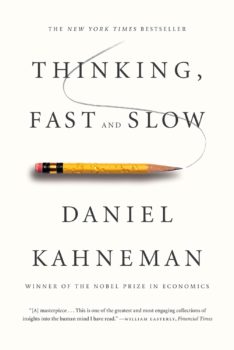
Daniel Kahneman’s “Thinking, Fast and Slow” is a monumental exploration into the mechanics of thought that has captivated readers and critics alike. By dissecting the dual processes of our cognition – System 1, the quick, intuitive response, and System 2, the deliberate, analytical thought – Kahneman uncovers the profound impact these systems have on our decisions and our lives. This book stands as a beacon for those aspiring to understand the complexities of human thought and the traps of cognitive biases.
Pro:
- Offers deep insights into how we think and make decisions.
- Provides a comprehensive review of psychological studies and empirical data.
- Engages readers with real-world applications of the concepts discussed, making it relevant to daily decision-making.
Contra:
- Some readers may find the depth of the content to be challenging.
- The lack of a cohesive theory at the end may leave some desiring more conclusive guidance.
- The volume of psychological experiments covered might overwhelm readers new to cognitive psychology.
I recommend this book to you if:
- You’re fascinated by the inner workings of the human mind.
- You seek to improve your decision-making skills.
- You enjoy in-depth analysis and can appreciate a book that makes you think critically about your thought processes.
3. The Subtle Art of Not Giving a F*ck by Mark Manson
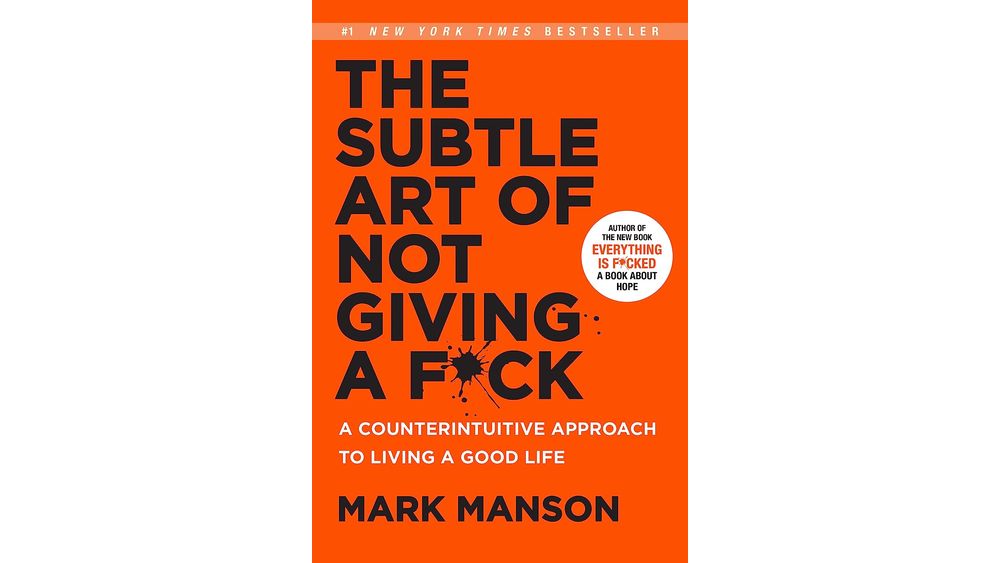
“The Subtle Art of Not Giving a F*ck” by Mark Manson takes a bold, no-holds-barred approach to self-help that has resonated with millions of readers. Manson challenges the conventional ‘think positive’ mantra, arguing that it’s more meaningful to confront and accept the limitations and hardships of life. With wit and sharp insights, this book encourages readers to find value in caring less about the trivial and more about what truly matters to them.
Pro:
- Emphasizes practical and honest advice, steering clear of false hope.
- Engaging and relatable writing style that makes complex ideas easily understandable.
- Incorporates entertaining stories and anecdotes to elucidate key points.
Contra:
- The candid tone and language might not appeal to all readers.
- Some might find the focus on embracing negatives to be counterintuitive to traditional self-help philosophies.
- The book’s central message might oversimplify complex psychological issues for some readers.
I recommend this book to you if:
- You’re seeking a refreshingly honest perspective on personal growth.
- You prefer real-world advice over feel-good platitudes.
- You enjoy a humorous and straightforward writing style that doesn’t sugarcoat the truths of life.
4. How to Win Friends and Influence People by Dale Carnegie
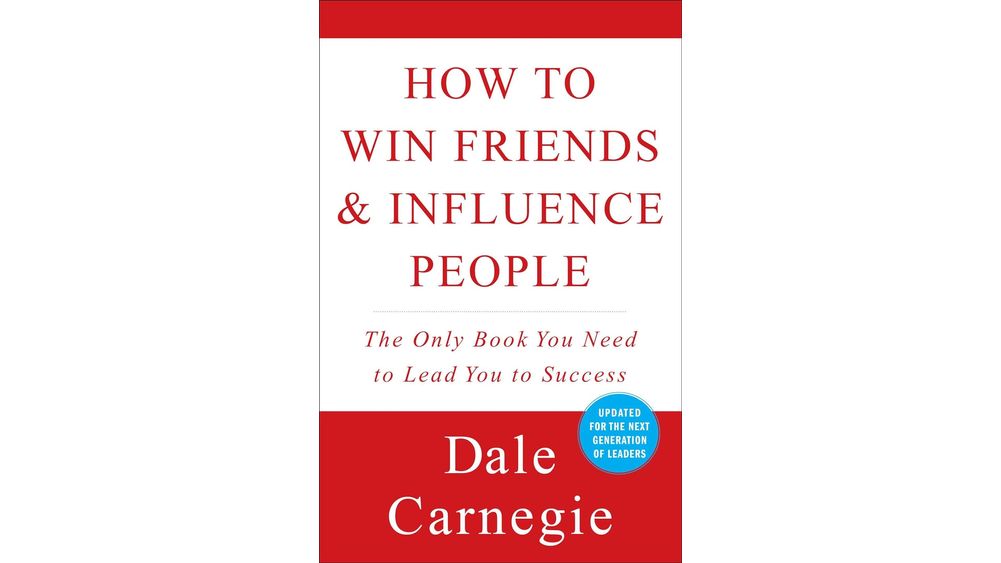
Dale Carnegie’s “How to Win Friends and Influence People” is much more than its title suggests. Many might find the title a tad misleading, raising eyebrows with its blunt assertion. Yet beneath its cover lies a treasure trove of wisdom on leadership and interpersonal skills. Initially, one might resist diving into its pages, deterred by the preconception of a shallow attempt at teaching friendship skills. However, the reality is quite the opposite. This book equips you with the tools for effective leadership, making it a valuable ally in the professional world.
The essence of Carnegie’s work is simple yet profound; it brings to light the common-sense principles of human interaction and leadership that often elude us in our daily hustle. By revisiting these principles, readers are reminded of the importance of fostering genuine connections and leading with empathy. The book serves as a beacon, guiding readers through the intricate dance of human relationships with grace and dignity. With anecdotes that resonate and practical advice that stands the test of time, Carnegie’s book is a testament to the enduring power of social intelligence in professional success.
“How to Win Friends and Influence People” is not just a book; it’s a journey back to the basics of human decency and respect. The principles Carnegie discusses, from showing genuine appreciation to understanding others’ perspectives, are fundamental yet revolutionary in their implementation. This book, fluorescent with the wisdom of simplicity, shines a light on the art of influence and the importance of seeing and appreciating the human behind the professional facade.
Pro:
- Offers time-tested principles of effective leadership and interpersonal skills.
- Includes relatable anecdotes and practical advice for real-world application.
- Encourages a deeper understanding and practice of empathy and genuine relationship-building in professional settings.
Contra:
- The title may mislead readers expecting a simple guide on making friends.
- Some may find the principles too basic or common sense.
- Its age might lead some to question the relevance of its examples in today’s fast-paced world.
I recommend this book to you if:
- You are stepping into or currently in a leadership role.
- You wish to enhance your interpersonal skills in a professional environment.
- You are looking for classic but effective principles to navigate social interactions in your work life.
5. Man’s Search for Meaning by Viktor Frankl

Viktor Frankl’s “Man’s Search for Meaning” provides a profound exploration of survival, suffering, and resilience through the lens of his experiences in Nazi concentration camps. At its core, the book delves into the human condition, questioning the power of hope and purpose in the face of unimaginable horror. Frankl’s narrative not only recounts the physical and psychological atrocities of camp life but also offers a stunning testament to the strength of the human spirit.
Through Frankl’s eyes, we witness the capacity for humans to find meaning in the most dire circumstances. His observations extend beyond the personal, shedding light on the broader human experience and our collective capability to overcome adversity. This book is more than a memoir; it is a guide to finding purpose in suffering and a call to action for personal agency in the pursuit of meaning. Frankl’s philosophical and psychological insights contribute to a timeless message of resilience and hope.
In our current global climate, with wars and humanitarian crises unfolding, “Man’s Search for Meaning” feels especially relevant. It challenges readers to reflect on their own lives and the pursuits that bring them meaning. Frankl’s account, while rooted in the specific horrors of the Holocaust, transcends its historical context to offer universal lessons in endurance, the importance of belief in something greater than oneself, and the pursuit of life’s meaning beyond circumstantial suffering.
Pro:
- Offers deep philosophical and psychological insights into human nature and resilience.
- Provides a poignant and compelling first-hand account of life in Nazi concentration camps.
- Encourages readers to find personal meaning and purpose, even in the hardest times.
Contra:
- Can be emotionally overwhelming due to its vivid descriptions of concentration camp life and suffering.
- The philosophical content might be dense for readers looking for a lighter read.
- The emphasis on finding individual meaning may not resonate with all readers.
I recommend this book to you if:
- You are interested in psychological and philosophical perspectives on suffering and resilience.
- You want to understand the human capacity for hope and endurance under extreme conditions.
- You are searching for a deeper meaning in life, particularly during challenging times.
6. The Power of Now by Eckhart Tolle

Eckhart Tolle’s “The Power of Now” has been a beacon of hope and transformation for many, guiding readers through some of their darkest times and leading them towards a path of self-realization and enlightenment. Drawing from personal tribulations and the deep pits of despair, the book emerges as a life-changing manual that beautifully intertwines spirituality with practical approaches to daily living. The narrative navigates through complex themes like mindfulness, presence, and the deep-rooted connection between suffering and the ego, serving as a lighthouse for those lost in the tumultuous seas of their minds.
Pro:
- Provides a comprehensive guide on how to achieve mental clarity and peace by living in the present moment.
- Offers practical exercises, like the act of “watching the thinker,” which can significantly reduce stress and anxiety.
- Its teachings on acceptance and focusing on the “Now” offer solace and actionable advice for dealing with life’s challenges.
Contra:
- The book’s emphasis on spiritual awakening might not resonate with everyone, especially those seeking more conventional self-help advice.
- Some readers may find the concepts difficult to implement or understand due to their abstract nature.
- The narrative structure and depth of the philosophical discussions might challenge readers unaccustomed to spiritual or introspective reading.
I recommend this book to you if:
- You’re seeking a deeper understanding of yourself and your place in the world.
- You’re battling with stress, anxiety, or depression and traditional methods haven’t helped.
- You’re open to exploring spirituality and mindfulness as tools for personal development.
7. The Four Agreements by Don Miguel Ruiz

Don Miguel Ruiz’s “The Four Agreements” is a luminary work, unveiling the profound impact of our belief systems and the power of language in shaping our reality. Drawing from linguistic and philosophical insights, the book masterfully debunks the notion of an absolute truth, inviting readers to adopt four simple, yet profoundly transformative agreements to revolutionize their personal freedom and happiness. It’s a call to liberate oneself from the confines of societal expectations and the self-imposed limitations that hinder growth.
The charm of this book lies in its simplicity and the relatable, straightforward manner in which it delivers life-altering wisdom. The agreements themselves serve as a compass navigating the reader through the often tumultuous journey of self-discovery and acceptance. The narrative is not just a guide but a companion, gently encouraging reflection, self-forgiveness, and a deeper compassion for oneself and others.
Pro:
- Presents a simple yet powerful framework that can be applied to enhance personal freedom and happiness.
- Encourages critical thinking about one’s belief systems and the liberating power of skepticism.
- Empowers readers to adopt a more positive and open perspective towards life’s challenges.
Contra:
- Readers steeped in a desire for concrete, scientific explanations may find the philosophical nature challenging.
- Its simplicity, while a strength, may be viewed by some as lacking depth.
- The book’s abstract concepts could seem elusive for those not already somewhat versed in introspective or philosophical thought.
I recommend this book to you if:
- You’re a student of life, keen on exploring the depths of personal belief systems.
- You find yourself often entangled in the stories and judgments of yourself and others.
- You’re on a quest for personal freedom, ready to embrace a journey of self-acceptance and love.
8. The Alchemist by Paulo Coelho

Paulo Coelho’s The Alchemist is a definitive masterpiece, narrating Santiago’s journey in pursuit of his Personal Legend. This narrative is not just a story; it’s an inspiring saga of self-discovery and pursuing one’s dreams. Coelho weaves a simple yet profound tale that is both engaging and philosophically enriching, highlighting the importance of listening to our hearts and learning to read the omens strewn along life’s path.
The Alchemist has been applauded for its universal appeal, compelling storytelling, and Coelho’s effortless ability to blend a sense of adventure with a deeper philosophical inquiry. The essence of the book lies in its ability to resonate with readers through its thought-provoking ideas on fate, destiny, and the interconnectedness of the universe.
Pro:
- Offers deep philosophical insights in a simple and accessible manner.
- Encourages readers to pursue their dreams and listen to their hearts.
- Universally relatable themes of adventure, love, and destiny.
Contra:
- The straightforward narrative might be perceived as overly simplistic by some readers.
- The character development is minimalistic, focusing more on the journey rather than the detail of character progression.
- A suspension of disbelief is often required to fully engage with the story’s mystical elements.
I recommend this book to you if:
- You’re in search of literary inspiration to follow your dreams.
- You enjoy novels that blend philosophical insights with storytelling.
- You’re looking for a reflective and uplifting read.
9. The 48 Laws of Power by Robert Greene
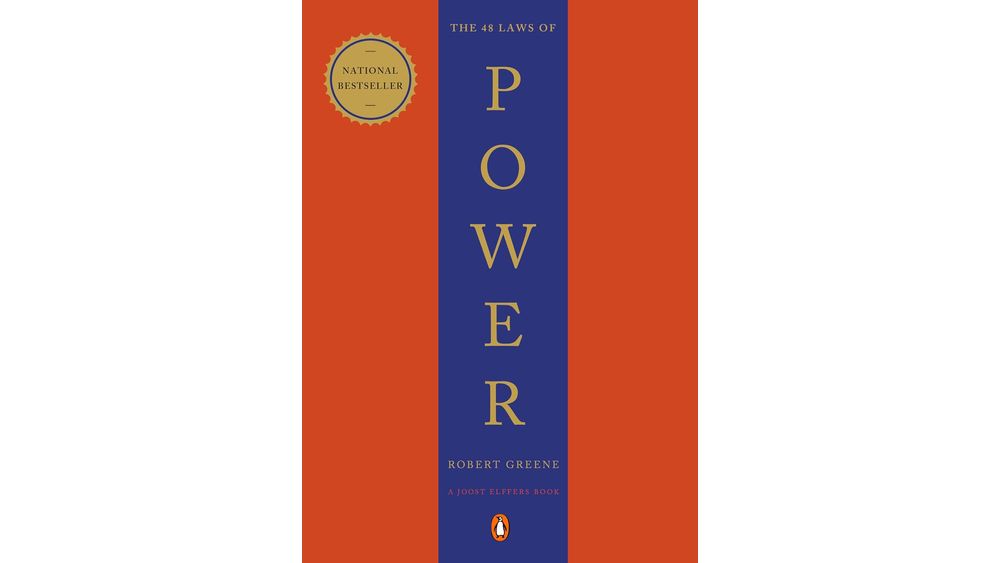
Robert Greene’s “The 48 Laws of Power” is a brilliant tapestry of historical anecdotes, intriguing stories, and astute analysis that serves as a guide to understanding power dynamics in both personal and professional relationships. Each law is meticulously devised, drawing from tales of renowned leaders and influential figures whose actions embody or contradict these laws.
Greene provides a deep dive into each principle, offering clarity and context through his interpretations. The structure of the book, with its bold claims and polarizing perspectives, invites readers to engage in serious reflection and cautious application of its teachings. This is not merely a book but a manual for navigating the complexities of human interactions with wisdom and prudence.
Pro:
- Offers a comprehensive understanding of power dynamics through historical examples.
- Encourages reflective thinking and personal growth.
- Provides practical insight into protecting oneself against manipulation.
Contra:
- Its principles can be seen as morally grey or manipulative if misinterpreted.
- Requires careful and critical reading to apply the laws ethically and effectively.
- The book’s Machiavellian approach may not resonate with all readers.
I recommend this book to you if:
- You’re fascinated by the historical and psychological underpinnings of power.
- You seek to understand and navigate social dynamics more effectively.
- You’re looking for comprehensive strategies to protect against manipulation.
10. Awaken the Giant Within by Tony Robbins

“Awaken the Giant Within” is a transformative journey led by Tony Robbins, renowned for his expertise in peak performance and personal achievement. Robbins delves into the psychology of change, empowering readers to master their emotions, identify and shift limiting beliefs, and create meaningful, lasting change in their lives. His approach is hands-on, filled with practical exercises and techniques designed to help readers redefine their destiny, overcome bad habits, and fully embrace their true potential.
Robbins’ message is grounded in the understanding that our decisions are driven by the dual forces of pain and pleasure, and he offers in-depth guidance on how to reassociate these forces in favor of healthier choices and behaviors. His emphasis on quality questioning and the power of language highlights how subtle shifts can lead to profound outcomes. This book isn’t just about self-improvement; it’s a blueprint for living a life of clarity, purpose, and fulfillment.
Pro:
- Provides a clear framework for understanding and implementing change in your life.
- Rich with actionable exercises and strategies for personal growth.
- Fosters a deep understanding of the psychological factors that drive our behaviors.
Contra:
- Some may find Robbins’ style overly enthusiastic or too prescriptive.
- Requires commitment to engage with and apply the exercises for true impact.
- The volume of information and strategies might be overwhelming for some readers.
I recommend this book to you if:
- You’re seeking practical tools and exercises to drive significant life changes.
- You’re interested in the psychological aspects of personal development.
- You desire to create a dynamic shift in how you perceive and engage with the world around you.
11. The Power of Habit by Charles Duhigg
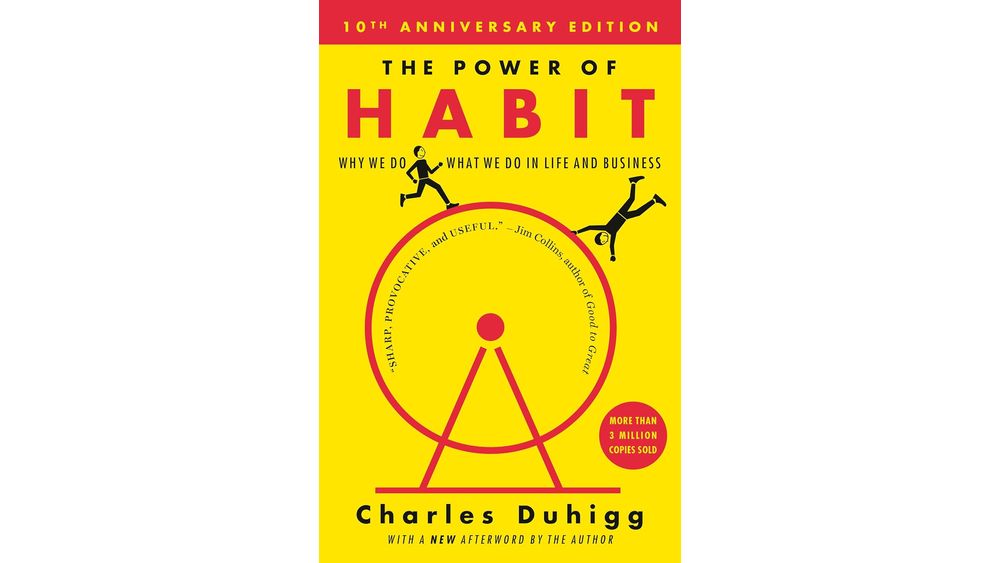
Charles Duhigg’s “The Power of Habit” delves deep into the psychology and science behind habits, how they’re formed, how they can be changed, and their profound impact on our lives and society. Through engaging and insightful narratives, Duhigg explores the pattern of habits known as the habit loop, consisting of a cue, routine, and reward. This concept is the backbone of many transformations – personal, organizational, and societal.
With examples ranging from individuals overcoming addictions to major corporations like Alcoa transforming their work culture, Duhigg makes the science of habits accessible and practically applicable. The meticulous research and real-life stories act as testaments to the power of habits, providing readers with the tools to identify and reshape their own habits.
Pro:
- Provides a deep understanding of how habits work, making it easier for readers to identify and change their own habits.
- Rich in engaging narratives that illustrate the practical applications of the book’s concepts in real-life scenarios.
- Offers a comprehensive look at habits on an individual, organizational, and societal level, broadening the reader’s perspective on the influence of habits.
Contra:
- Lacks chapter summaries and subheadings, which can make it harder for readers to review concepts and navigate the book.
- Some stories may feel prolonged for readers more interested in the scientific details than anecdotal evidence.
- The structure of the book might seem disjointed to some, as it jumps between personal stories and scientific research.
I recommend this book to you if:
- You’re interested in changing or forming new habits.
- You enjoy real-life success stories that illustrate psychological concepts.
- You’re curious about the science behind habits and how they influence various aspects of life.
12. The Magic of Thinking Big by David Joseph Schwartz
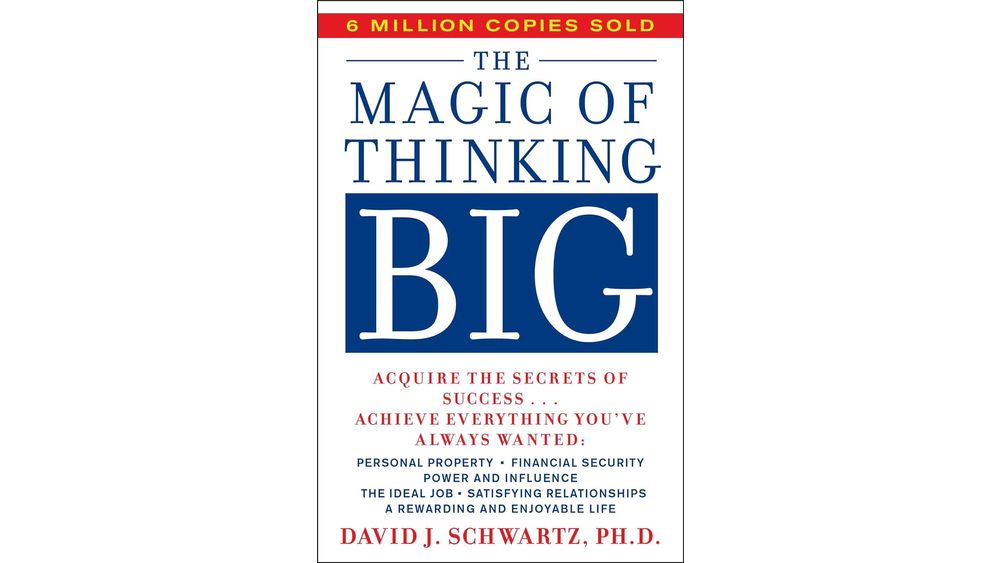
“The Magic of Thinking Big” by David Joseph Schwartz stands as a timeless masterpiece in the self-help genre, empowering readers to break the shackles of small thinking and embrace a life of bold ambitions. Schwartz highlights the indisputable power of positive thinking and its remarkable ability to transform personal and professional lives.
Each page brims with wisdom and actionable strategies, from improving relationships to excelling in the workplace. Through compelling stories and thought-provoking questions, Schwartz creates a manual for achieving unprecedented success by expanding our mental horizons and thinking bigger.
Pro:
- Offers practical, easy-to-implement strategies that readers can apply immediately for tangible results.
- Packed with inspirational stories that motivate and encourage readers to adopt a big-thinking mindset.
- Timeless relevance: Despite its publication years ago, the book’s principles remain profoundly effective and applicable to today’s challenges.
Contra:
- Some may find the examples dated, as the book was written in an earlier era.
- Readers looking for new or groundbreaking self-help concepts might consider the advice common sense.
- The book’s optimistic tone could be perceived by some as oversimplifying complex life issues.
I recommend this book to you if:
- You’re seeking inspiration to dream bigger and achieve more.
- You appreciate practical advice intertwined with real-life examples.
- You’re on the lookout for a self-help classic that has stood the test of time.
13. Mindset: The New Psychology of Success by Carol S. Dweck

Carol S. Dweck’s “Mindset: The New Psychology of Success” delves into the powerful dichotomy between the fixed mindset and the growth mindset. The book eloquently unfolds how these mindsets influence our lives, from education and personal relationships to our professional careers. Dweck convincingly debunks the myth that intelligence and talent are fixed traits, offering instead a compelling argument that our abilities and intelligence can grow through effort, learning, and persistence.
Throughout the book, Dweck provides rich case studies and personal anecdotes, which illustrate how adopting a growth mindset can lead to personal and professional achievements. Whether it’s overcoming the fear of criticism or embracing challenges as opportunities for growth, this book offers insightful guidance for anyone looking to foster a more flexible and resilient mindset.
Pro:
- Offers a deeply researched and well-articulated contrast between fixed and growth mindsets, providing readers with a clear understanding of how mindset affects every aspect of their lives.
- Dweck’s use of case studies and personal anecdotes makes the scientific concepts accessible and relatable.
- Provides practical advice on fostering a growth mindset, making it a valuable tool for personal development.
Contra:
- Some readers might find the book repetitive, as it frequently reinforces the core concepts of fixed and growth mindsets.
- Critics argue that the book could benefit from more varied examples from diverse socio-economic backgrounds.
- The division between fixed and growth mindsets is sometimes presented as overly simplistic.
I recommend this book to you if:
- You’re interested in personal growth and self-improvement.
- You’re a parent, educator, or coach looking for ways to encourage growth mindsets in others.
- You’re grappling with feelings of inadequacy or fear of failure and seeking a transformative perspective shift.
14. Grit: The Power of Passion and Perseverance by Angela Duckworth

Angela Duckworth’s “Grit: The Power of Passion and Perseverance” is a fascinating exploration of what truly drives success. Contrary to the commonplace belief that success is all about talent, Duckworth presents a compelling case for grit – a unique blend of passion and perseverance. Drawing from psychological research, personal interviews, and stirring anecdotes, Duckworth shows how grit can be cultivated and why it’s a key component of achievement in any field.
The book is more than an academic treatise; it’s a personal and inspiring journey that offers practical insights into how we can all live grittier – and ultimately more successful – lives. From stories of West Point cadets to National Spelling Bee finalists, Duckworth paints a vivid picture of how grit has propelled individuals to extraordinary heights of achievement.
Pro:
- Duckworth’s engaging narrative style makes complex psychological concepts easily understandable and relatable.
- The wide variety of stories and examples from different domains makes the concept of grit accessible to a broad audience.
- Offers practical advice on cultivating grit, making it a valuable resource for personal development.
Contra:
- Some readers may find the emphasis on hard work over talent as overlooking the nuanced role talent can play in personal achievement.
- While inspiring, the book may not provide enough detailed strategies for individuals looking for step-by-step guidance on developing grit.
- The focus is broad and may not address specific challenges or goals of individual readers.
I recommend this book to you if:
- You feel like talent alone hasn’t helped you achieve your goals.
- You’re looking for motivation and strategies to persevere through challenges.
- You’re interested in psychological research and how it applies to personal development.
15. The Art of Possibility by Rosamund Stone Zander and Benjamin Zander

Diving into “The Art of Possibility” by Rosamund Stone Zander and Benjamin Zander is akin to embarking on a journey towards a new horizon of thoughts and actions. Both authors, through their unique blend of experiences in music, executive coaching, and therapy, invite us to explore paths to unlock our potential by reshaping our perceptions and embracing possibility. Their narrative is laden with enlightening anecdotes from music, art, and business, adeptly tied to each practice presented in the book, making the concepts not just accessible but deeply resonant.
It’s fascinating how this book leverages stories primarily from the world of classical music – a realm some may initially view as unrelatable – and manages to draw profound, universal lessons applicable to everyone’s personal and professional life. The Zanders’ approach, as articulated through practices like giving an ‘A’ and Rule Number 6, transforms our interactions and the way we perceive our challenges. It embodies a powerful message: the way we frame our stories can either open us up to a universe of possibilities or confine us within the self-imposed limits of our current narratives.
Pro:
- Offers a unique perspective on personal and professional growth by intertwining lessons from music, business, and therapy.
- Provides practical, actionable practices allowing individuals to shift towards more positive, expansive ways of thinking and being.
- The anecdotal style engages readers, making complex concepts accessible and relatable.
Contra:
- The heavy reliance on musical and artistic anecdotes might not resonate with individuals seeking more conventional self-help advice.
- Some readers might find the book’s approach too abstract or conceptual without direct, step-by-step guidance on application to daily life.
- The impact of the lessons may vary greatly among readers, with some finding transformational value while others may struggle to find relevance.
I recommend this book to you if:
- You’re in search of a refreshing, artistic take on self-improvement.
- You enjoy exploring new perspectives that challenge conventional thinking.
- You value stories and anecdotes as a means to understand complex ideas.
16. Daring Greatly by Brené Brown
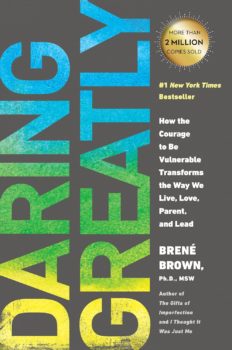
“Daring Greatly” by Brené Brown thrusts us into the heart of vulnerability and shame – topics that many of us, understandably, might shy away from. Yet, Brown’s compelling narrative, grounded in years of research, suggests that embracing vulnerability is not a weakness but a courageous path to achieving what she calls “wholeheartedness.” Through personal stories, including a candid encounter with a stranger in a coffee shop, Brown illustrates how vulnerability can profoundly connect us, foster genuine interactions, and lead to unexpected growth.
Brown dismantles the cultural myth of vulnerability as a form of weakness, instead positioning it as the birthplace of innovation, creativity, and change. Her writing resonates deeply, as it speaks to the “never enough” culture that incessantly whispers: we’re not working, succeeding, or even eating healthy enough. “Daring Greatly” challenges us to confront these pervasive feelings of shame and inadequacy by stepping into our vulnerabilities and practicing gratitude and empathy – thus, weaving a path to happiness and wholehearted living.
Pro:
- Brown’s authentic and vulnerable storytelling connects deeply with the reader, making the principles of the book relatable and practical.
- The book provides a comprehensive exploration of how vulnerability functions in personal and professional contexts.
- Offers actionable advice and strategies for transforming the way we live, love, parent, and lead by embracing vulnerability.
Contra:
- The focus on vulnerability and shame may feel too intense for some readers, potentially making the content challenging to engage with.
- Readers looking for quick-fix solutions might find the depth and the introspective nature of the book overwhelming.
- Some may argue the book’s concepts around vulnerability lack novelty, especially those familiar with Brown’s TED talks and previous work.
I recommend this book to you if:
- You’re prepared to dive deep into the concepts of vulnerability and shame with an open heart.
- You appreciate honesty and authenticity in writing and are looking for life-changing perspectives.
- You’re on the lookout for strategies that address personal growth and connection on a profound level.
17. The Obstacle Is the Way by Ryan Holiday
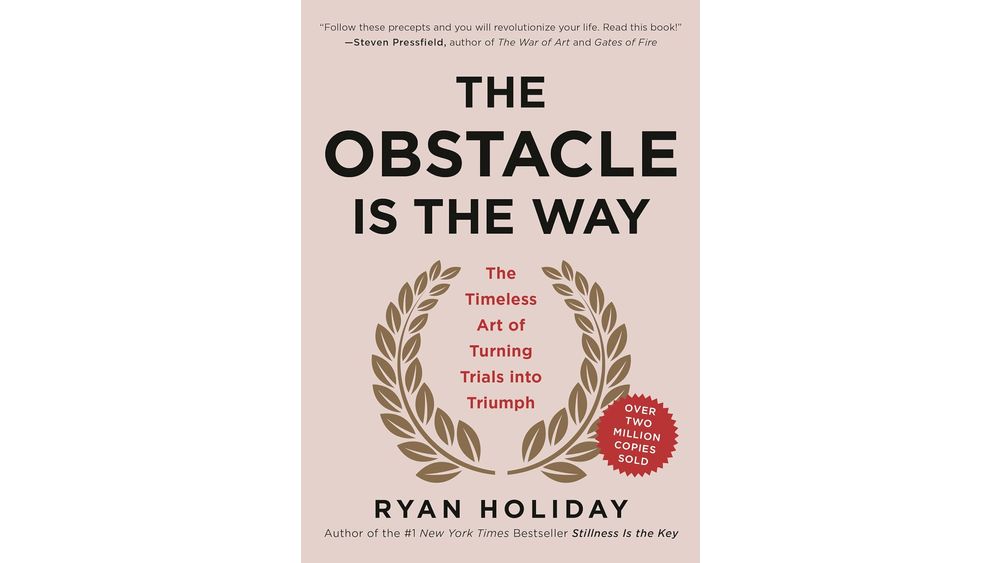
Through the meticulous weaving of historical anecdotes and philosophical stoicism, Ryan Holiday presents a captivating journey in “The Obstacle Is the Way” that turns adversity into advantage. This book shines a light on the undeniable truth that obstacles are not just to be endured but can be harnessed as stepping stones to greater success. Holiday’s narrative is a testament to the power of perception, action, and will, making complex philosophical concepts accessible and actionable for the modern reader.
With a narrative that traverses from the boardrooms to the sports fields, Ryan’s articulate translation of stoic philosophy for contemporary life challenges and guides the reader through internal battles towards triumph. Whether it’s referring to historical figures like Marcus Aurelius or modern-day icons, Holiday excels in demonstrating that the essence of overcoming obstacles transcends time. It’s a dynamic call to action, energizing the reader to confront their own obstacles with renewed courage and resilience.
Pro:
- Offers a fresh perspective on facing challenges by embracing stoic philosophy.
- Provides real-world examples that span across time, making the teachings relatable and applicable.
- Encourages action and resilience, motivating individuals to move through obstacles rather than around them.
Contra:
- The philosophical approach may not resonate with readers looking for more conventional self-help advice.
- Some historical examples might feel distant or less relevant to those unfamiliar with stoic philosophy.
- The emphasis on personal responsibility and action could be overwhelming for those in search of passive solutions.
I recommend this book to you if:
- You’re intrigued by the idea of turning adversity into an advantage.
- You appreciate learning through historical anecdotes and philosophical musings.
- You’re seeking an actionable guide to confront and overcome the obstacles in your path.
18. Deep Work by Cal Newport
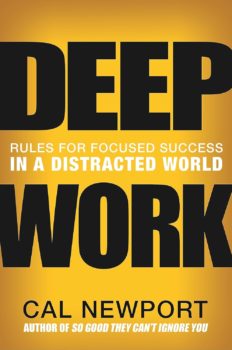
Cal Newport’s “Deep Work” is a compelling tribute to the lost art of deep, focused work in our increasingly distracted world. According to Newport, the key to unparalleled productivity and understanding lies not in multitasking or the pursuit of productivity hacks, but in the ability to dive deeply into complex, cognitively demanding tasks without distraction. This book stands as a beacon for anyone looking to extract more meaning from their professional endeavors and to excel in a hyper-competitive environment.
Newport meticulously differentiates between “Deep Work” – the kind of intense, uninterrupted work that pushes our cognitive capabilities to their limits – and “Shallow Work”, which, though often occupying the bulk of our days, contributes little to our true goals and skill development. Through riveting case studies and accessible advice, “Deep Work” offers a philosophical framework and a practical roadmap for reclaiming concentration, enhancing skill, and drastically improving productivity and satisfaction.
Pro:
- Advocates for a culture of deep, meaningful work in an age of constant distraction.
- Offers practical strategies to incorporate deep work into daily life, increasing productivity and satisfaction.
- Challenges prevailing myths about work and productivity, inviting introspection about one’s work habits and goals.
Contra:
- The approach may seem too prescriptive or rigid for those who thrive under different work styles or in creative fields.
- Assumes the ability to control one’s work environment and schedule, which may not be possible for everyone.
- Might downplay the importance of rest, relaxation, and social interaction in overall well-being and creativity.
I recommend this book to you if:
- You struggle to maintain focus in an era of constant interruptions.
- You’re interested in significantly improving your productivity and output in your professional or personal projects.
- You’re seeking to find more satisfaction and meaning in your work by engaging deeply with complex tasks.
19. The 5 Love Languages by Gary Chapman

Gary Chapman’s “The 5 Love Languages” opens a window into the understanding of how love is uniquely communicated and received by individuals. Grounded in the conviction that love does not possess a universal language, this book stands out in its genre for illuminating the pathways to deeper connection through recognizing and speaking one’s partner’s love language. Chapman eloquently underscores that miscommunications in love are often a result of linguistic differences in expressing affection, rather than a lack of love itself.
The core premise of the book rests on identifying and understanding the five distinct ways people express and experience love: Words of Affirmation, Acts of Service, Receiving Gifts, Quality Time, and Physical Touch. Through a blend of theoretical explanation and practical advice, the reader embarks on a journey of self-discovery and relationship enhancement. Chapman’s engaging narrative and real-life examples persuade readers to view their relationships through a new lens, potentially transforming misunderstandings into opportunities for growth.
Pro:
- Offers a unique perspective on love and communication within relationships.
- Provides practical advice and exercises to discover and implement one’s love language.
- Has transformed numerous relationships, as evidenced by broad reader acclaim and testimonials.
Contra:
- Some readers may find the concepts too simplistic for complex relationship issues.
- The application of the five languages can require significant effort and willingness from both partners.
- Skeptic viewers might dismiss the book’s approach as oversimplified or generalized.
I recommend this book to you if:
- You’re seeking to deepen the connection in your relationship.
- You enjoy practical advice that can be immediately applied.
- You’re open to exploring new frameworks for understanding love and affection.
20. The Life-Changing Magic of Tidying Up by Marie Kondo
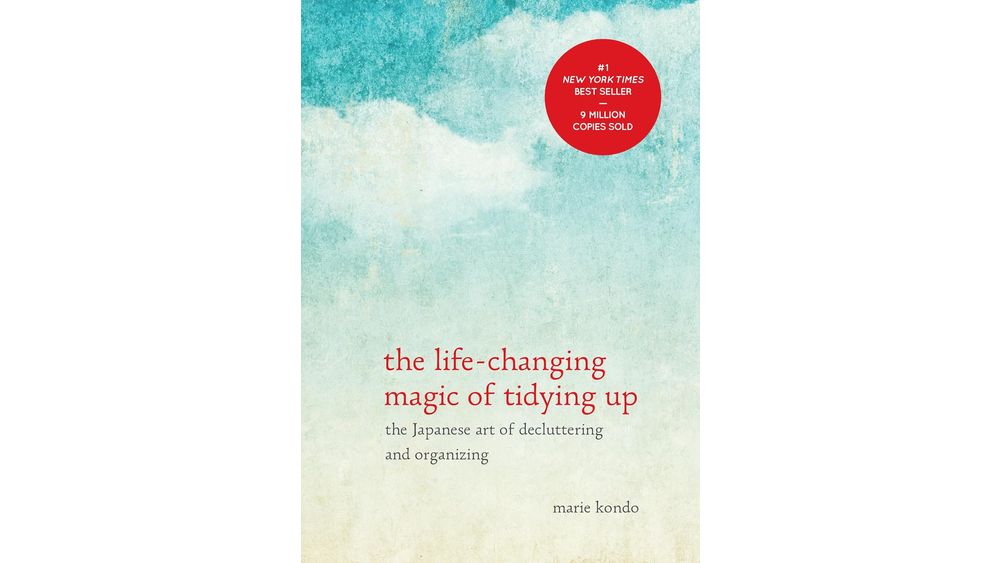
Marie Kondo’s “The Life-Changing Magic of Tidying Up” has emerged as a cultural phenomenon, teaching readers the art of decluttering and organizing their living spaces to spark joy in their lives. Kondo’s KonMari Method not only revolutionizes tidying habits but also offers a philosophical approach to belongings, urging individuals to retain only those that truly bring joy. This book extends beyond mere cleaning to touch upon minimalism and mindfulness, encouraging a deeper connection with the items we choose to keep.
The book delineates a clear, step-by-step guide to decluttering every aspect of one’s home, from clothes to mementos. It introduces readers to the somewhat quirky yet profound practices, such as thanking items for their service before parting with them. Kondo’s method is not a simple cleaning routine; it’s a lifestyle that promises a transformative journey, aiming to redefine one’s relationship with possessions and, by extension, life itself.
Pro:
- Encourages a minimalist lifestyle that can lead to a cleaner, more organized space.
- Focuses on mindfulness and gratitude, offering a refreshing take on dealing with possessions.
- Provides detailed instructions for the KonMari Method, making the tidying process systematic and achievable.
Contra:
- The methodology may seem overwhelming for individuals with extensive belongings or limited time.
- Some recommendations, like discarding books, might be controversial for avid readers.
- The one-size-fits-all approach may not suit everyone’s lifestyle or tidying needs.
I recommend this book to you if:
- You’re interested in minimalism and looking for ways to declutter.
- You seek a spiritual or mindful approach to tidying and possessions.
- You’re ready for a potentially life-changing endeavor to tidy up once and for all.
21. Quiet: The Power of Introverts in a World That Can’t Stop Talking by Susan Cain

In “Quiet: The Power of Introverts in a World That Can’t Stop Talking,” Susan Cain embarks on a journey of self-discovery for introverts in a society that predominantly values extroversion. The reader is taken on a deep dive into the traits that define introversion, illustrating why these characteristics are not just normal but valuable in their own right. Cain masterfully combines personal anecdotes with scientific research, making the text not only informative but also immensely relatable and compelling.
The narrative provides a beacon of hope and validation for introverts who have felt misunderstood or pressured to conform to extroversion. It enlightens the reader about the “Culture of Personality” and equips introverts with the understanding that they don’t need to change who they are to find their place in the world. Through a blend of encouragement and practical advice, Cain advocates for the strengths of introversion in personal and professional environments, making a strong case for the power of quietness.
Pro:
- Offers deep insights into the nature of introversion, promoting self-acceptance and understanding.
- Based on a combination of personal stories and research, making it relatable and credible.
- Provides practical strategies for introverts to navigate a world designed for extroverts, enhancing personal and professional growth.
Contra:
- Readers who thrive on high-energy, action-oriented advice may find the pace and tone more reflective than motivational.
- Some may feel that the book leans too heavily on anecdotal evidence, wishing for more quantified research.
- The focus is predominantly on introverts, which might lead extroverts to feel less addressed or represented.
I recommend this book to you if:
- You’ve ever felt overwhelmed in loud or high-stimulation environments.
- You’re seeking validation for your introverted tendencies in a society that values extroversion.
- You’re interested in psychology and how personality types affect our interactions and work life.
FAQs
1. What makes a self-development book impactful?
An impactful self-development book often blends compelling narratives with practical advice, making the principles it aims to teach both digestible and memorable.
Strong, relatable examples and personal stories help readers visualize how these principles can be applied to their own lives, enhancing the book’s impact.
Ultimately, the most powerful self-development books are those that not only provide insightful information but also motivate and inspire readers to make tangible changes in their thinking, habits, and general approach to life.
2. How often should I read self-development books?
How often you should read self-development books depends largely on your personal growth goals and your capacity for integrating new information.
For some, a steady diet of one book per month allows for deep absorption of the material and ample time for application.
Others may find a more intensive approach, such as reading a new book every week, to be stimulating and a fast track to personal development.
The key is to balance new learning with actionable steps, ensuring that reading becomes a catalyst for real change.
3. Can self-help books truly change my life?
Can self-help books truly change my life? Indeed, the impact of self-help books significantly varies among readers, but numerous individuals report profound personal transformations after applying the insights and strategies they’ve gleaned from these works.
Key factors in such transformations include:
- The readers’ commitment to applying the principles in their daily lives.
- The relevance of the book’s subject matter to their personal challenges and goals.
In essence, while self-help books possess the potential to inspire fundamental changes, the actual transformation depends on individual engagement and application.
4. How do I choose the right self-development book for me?
Choosing the right self-development book involves considering several aspects to ensure it meets your specific needs and preferences. [1]
To find the ideal match, consider:
- Identifying your current challenges and what you hope to achieve through the book. This can narrow down your search to books that are most relevant.
- Looking at reviews and recommendations, which can provide insights into how others found value in the book.
Ultimately, the right book for you is one that resonates with your current situation and offers practical, actionable advice that you can realistically apply.
Conclusion
Embarking on a journey of self-improvement and personal growth can be a transformative experience, and selecting the right literature to guide you along this path is crucial. Each of these books, with their unique perspectives and insights, serves as a beacon of knowledge, challenging us to look within and strive for a better version of ourselves.
In navigating the vast seas of literature on self-improvement, it becomes clear that the best books on self development are those that not only provide actionable advice but also resonate with us on a deeper level. They push us to question our preconceived notions, inspire us to overcome our limits, and offer comfort during times of struggle. Choosing the right book is akin to selecting a mentor – one whose wisdom we seek and whose experiences we can learn from.
As we close this chapter, remember that the journey of self-development is personal and ever-evolving. May the books listed here light your path with wisdom, insight, and joy. Let them be your companions in the pursuit of fulfillment and growth. Thank you for embarking on this journey with me, and may you find the transformation you seek. Until we meet again, happy reading, my friends.
Warmly,
Emma
